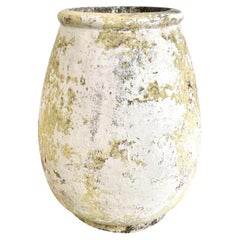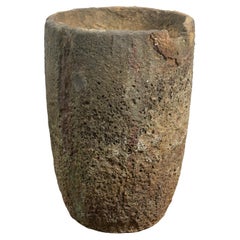James Mont Building and Garden Elements
James Mont’s life as an unmistakably talented furniture designer and interior decorator could fill the pages of a best-selling novel or be reimagined as a Hollywood feature film. From the 1930s through the 1960s, Tinseltown’s glitterati and Manhattan’s Mafia underworld coveted his sofas, coffee tables and table lamps.
Mont was born Demetrios Pecintoglu in Istanbul, Turkey, in 1904 to a family of artists. He reportedly studied architecture and art in Spain and France, and during the 1920s, Mont immigrated with his family to the United States.
Mont and his family settled in New York, where he found work in a Brooklyn electrical supply shop. There he sold hardware and designed his own lighting fixtures. The latter caught the eye of a gangster named Frankie Yale, who commissioned him to refurnish his house. Mont’s opulent designs drew on Art Deco, Hollywood Regency and were occasionally marked by chinoiserie, then a very popular trend in decorating. He created the kind of low-profile side tables and sofas that are frequently associated with mid-century modernism, and he is credited today with helping popularize the integration of Asian influences in modern American design.
Mont soon attracted New York City’s most infamous crime bosses, including Charles “Lucky” Luciano and Frank Costello. For a range of mobsters, he created fashionable, functional and sophisticated pieces such as collapsible home bars that would fold down and out of view — a particularly convenient feature during Prohibition — and tables and desks with secret drawers, which were also handy to Mont’s shady clientele.
“You bought a bar from him, and he would also deliver booze in a baby carriage,” antiques dealer and furniture retailer Todd Merrill told New York about Mont in 2008.
Mont designed a room for the World’s Fair in 1939 and later befriended Hollywood celebrities such as Bob Hope, who was best man at his wedding, Irving Berlin and Lana Turner. During the 1940s and ‘50s, Mont continued designing furniture, mastering finishing techniques such as lacquering and incorporating a distinctive “leafing” print effect with silver and gold into his pieces.
Mont’s designs enjoyed a resurgence in the 1990s, and his pieces continue to be sought after by collectors.
On 1stDibs, discover a range of vintage James Mont sideboards, tables and storage cabinets.
1960s American Vintage James Mont Building and Garden Elements
Wood
1960s Swiss Mid-Century Modern Vintage James Mont Building and Garden Elements
Concrete
20th Century French Organic Modern James Mont Building and Garden Elements
Stone, Concrete
20th Century European Greco Roman James Mont Building and Garden Elements
Concrete
20th Century French French Provincial James Mont Building and Garden Elements
Cast Stone
1960s Swiss Vintage James Mont Building and Garden Elements
Concrete
21st Century and Contemporary American Neoclassical James Mont Building and Garden Elements
Concrete
1960s Swiss Vintage James Mont Building and Garden Elements
Concrete
2010s American Modern James Mont Building and Garden Elements
Iron
18th Century Chinese Qing Antique James Mont Building and Garden Elements
Granite
20th Century James Mont Building and Garden Elements
Early 20th Century European Neoclassical James Mont Building and Garden Elements
Iron
Early 1900s American Organic Modern Antique James Mont Building and Garden Elements
Cement


